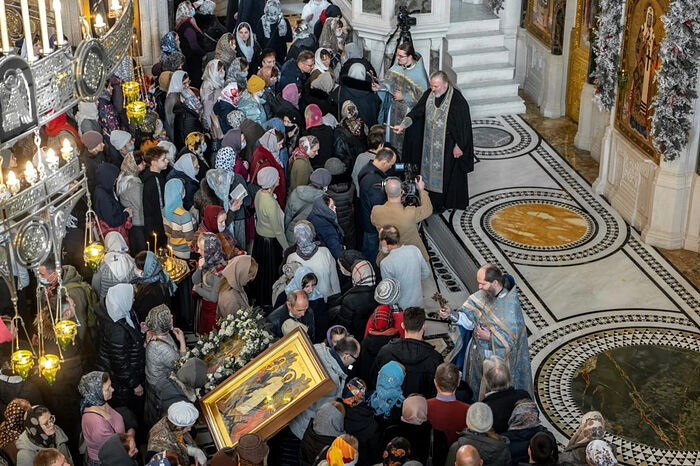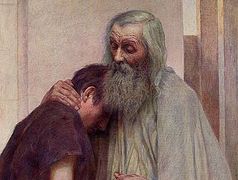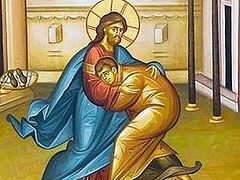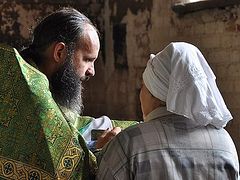Dear brothers and sisters! The second preparatory Sunday before Great Lent is called the Sunday of the Prodigal Son, according to the Gospel parable that talks about the immeasurable and boundless love of a father and the relationship of his sons—the younger, who squandered all his possessions and all his skills, and the elder son—not wiser, but jealous and supposedly righteous.
This well-known example of the prodigal son’s behavior, the contrasting motives of the elder son’s words against him, and the all-embracing mercy of the father have become models of communication in society and sources of cultural inspiration.
With all the parable’s concentration on the character and behavior of the younger, prodigal son, the main image for us in the sense of repentance is, of course, the merciful heart of the father—a type of the Almighty Father, God the Father.
In the truthfulness and picturesqueness of their passions, the sons emphasize the immutability and invariability of the fathers’ love for his children. The younger son wanted to take his share of the inheritance and leave his father’s house. Condescending to the freedom of his foolish and immature son, the father lets his child go in peace. Freedom intoxicates, and permissiveness gradually squanders everything given by the father. It happened as the father’s compassionate heart expected, but the weak, though independent young son couldn’t be helped—he was too far away.
All the horror that the son experienced in the “far country” is briefly described in the parable: He would have eaten the husks that pigs eat—let’s leave that to the conscience of the prodigal son. After all, we’re talking about the father.
The father waited, the father prayed, and flaring up with righteous anger, he wept, besieging him, hoping to see his wayward son. We see how he runs out to meet him when he was still far from home—it means the father’s done this more than once.
Do you know why we can say for sure that the father’s prayer was heard? Because the prodigal son didn’t fall into despair. The wayward young man found himself in the most humiliated and destructive state, but he found his bearings and came to his senses. He wasn’t looking for a way to end his worthless life.
Having sunk to the very bottom, the social bottom as they say now, the sinner pushed off from it with all his strength and started floating up. Firstly, the inexhaustible long-suffering of the father was a support that became an impetus for the profligate son. Secondly, the father’s prayer became the force that lifted the son from the bottom, because the young man hoped to see the face of the father and ask to be hired by him.
The son’s confession, recognizing himself as a servant, is so deep that it concerns not only his guilt before his father, but also the violation of the God-given order in the universe—he sinned against Heaven.
The ineffable joy over the returned son was so great, it overwhelmed the master of the house so much that clothes, gifts, and a feast, as well as the service of the father’s servants, were all brought out in abundance, which caused envy.
We can learn what the images of the older and younger sons, the father’s inheritance, a far country, the wasting of his substance, and other things from the Lord’s parable mean from the Ascetic Homily of St. Ignatius (Brianchaninov).
But it’s impossible not to talk about the all-wise, abundant love of the father, which extends even to the oldest son. We remember the reaction of the elder son, who did everything according to the rules, following the will of the father, and now suddenly envies the emotions on the face of his father at the sight of the younger son—a prodigal son, but his own flesh and blood. First, the father reveals to the elder sons that he’s always with him, under his protection, in grace; and second, that everything the father has is his. Reign for glory!
The teaching of love by love itself plays out in front of the whole household. “Let us rejoice and be glad,” the father says, “because it is none other than your brother who was dead and is now alive.” The joy-filled love of the father, who doesn’t remember the sins and offenses of the younger son, is the openness and accessibility of the father for the elder son.
The story of the Venerable David, the robber, explains the words of this parable about the incomparable love of God for any who open their hearts to Him.
The abbot of a certain monastery wouldn’t receive the elderly man. “Do you know who I am? David, chieftain of the robbers.”
Here was the thing: The ringleader and his gang did much evil to people, but one day, contemplating his life, he fell into fear and trembling, abandoned everything and everyone, and decided to retire to a monastery. But… they wouldn’t let him in.
“If you don’t accept me,” David warned menacingly, “I’ll return to my old ways, bring my gang here, and ruin the monastery.” I hope you can guess that everything ended well, and the old thief was tonsured in the angelic habit of monasticism. And as his hagiography says, he even came to work miracles after long asceticism.
There is joy in the presence of the angels of God over one sinner that repenteth (Lk. 15:10).
Amen.




